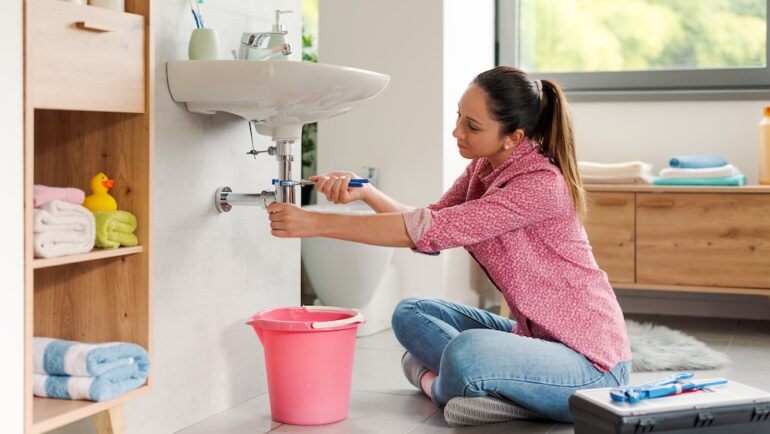As a homeowner, you must remember several important things to ensure your home’s plumbing fitness. This list includes what to do and what not to do. Here are 14 things you should know to keep your plumbing system operating well.
For plumbing fitness, do this, not that
- Check under sinks for leaks two or three times a year. Reach through the cabinet doors under the sink and feel the drainpipe and water supply lines from the top, where they join the underside of the sink, moving your hand to where each enters the wall. Feel the cabinet floor for moisture. Even small leaks over time can saturate flooring and sheetrock.
- Conduct the same procedure with the water supply line and drain hose to the clothes washer, feeling the supply lines and drain hose from the machine to the wall and the floor.
- The dishwasher may be mounted to the underside of the counter, so it can be a chore to slide it out to check behind it. However, you can remove the kick plate grid at the bottom front and shine a flashlight underneath, looking for signs of water.
- Go to where your water heater is and check for leaks.
- Also, examine your air-conditioner backup drip pan for signs that the main condensation drip line is clogged and backing up into the pan. If so, you must clear the main drip line of mold clogs.
- Do not pour cooking grease down the kitchen sink or disposal. Even if it is warm and liquid, it cools and congeals into a solid mass that can clog the “P-trap” under the sink.
- Do not grind fibrous vegetables like broccoli or asparagus stalks in the disposal. The fibers are tough enough to seize up and stop the disposal.
- Do not flush anything other than toilet paper and bodily waste down the toilet.
- Bathroom sink and shower-bath drains clog most often from accumulated hair and soap scum. Take off the drain cover and use a wire hook or needle-nose pliers to remove the gruesome hair monsters.
- Do not use harsh drain-clearing chemicals like sodium hydroxide or sulfuric acid, as these can severely damage your pipes. Instead, use enzymatic cleaners that dissolve organic waste, which is the likely culprit of clogs.
- If you have a septic system, any household cleaners you use should be rated “septic safe.” Bleach should be used on laundry at a minimum. Septic systems use bacteria to devour organic waste, and bleach and harsh cleaners kill the bacteria, causing the system to fail.
- Test your basement sump pump once per year.
- Drain your sprinkler irrigation system of water before winter. In spring and summer, periodically check each sprinkler head for leaks.
- Cover your outside faucets with winterizing covers before the first freeze in the fall, and uncover them after the last possible freeze date in the spring.
Related – Regular Plumbing Maintenance Minimizes Emergencies


